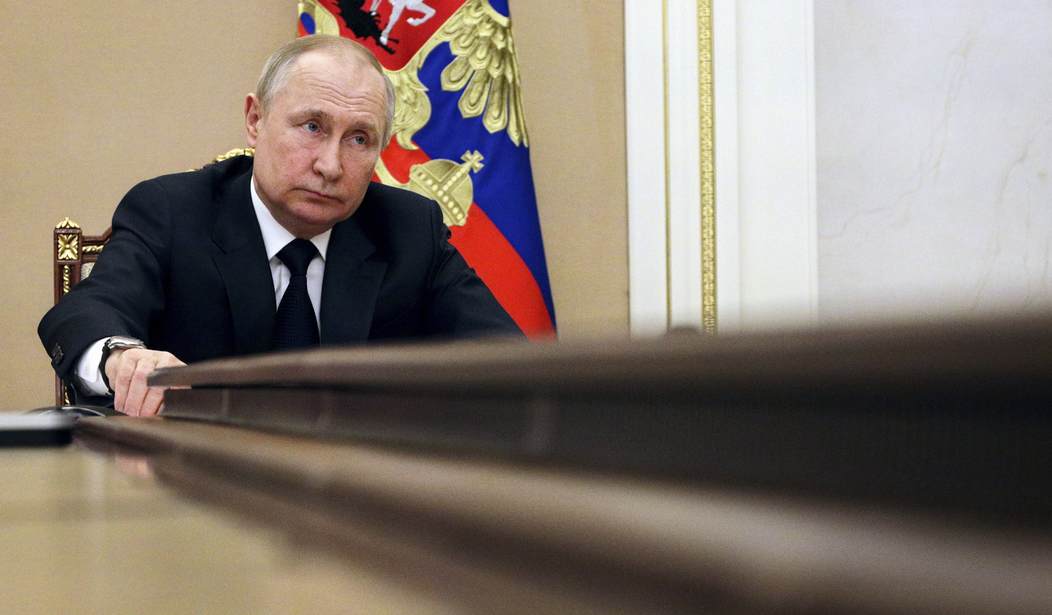It’s hard to tell whether Tony Blinken’s claim in the clip below is based on new intelligence or just something the White House is worried about and hoping to head off by alerting the world in advance, in case Putin’s thinking about it. They followed the same strategy last month when they revealed the Kremlin’s plans to invade Ukraine. Doing so didn’t deter Putin in that case but it did humiliate a whole lot of his allies and apologists, who had scoffed at the idea. Ultimately, the U.S. understood him better than they did.
The thinking here in Blinken’s remarks seems to be that Russia won’t use WMD if it can’t plausibly scapegoat the Ukrainians for the attack. And if the U.S. is out there shouting “a false flag is coming!” in advance, the intended scapegoating becomes that much less plausible and more ridiculous. No one, probably not even China, will believe Russia’s claims that the Ukrainians gassed themselves, especially with the recently vindicated American intelligence bureau warning what was coming.
Are we sure Putin hasn’t reached the point where he might admit responsibility for a chemical attack, though? The “false flag” here might not be “the Ukrainians gassed themselves.” It might be “we had to gas the Ukrainians because they were about to unleash the secret bioweapon the U.S. helped them build.” The Kremlin may have reached a stage of such profound humiliation and isolation from the rest of the world that it now believes it has little to lose by breaking out the WMD and flexing its muscles.
For the record, U.S. and European intelligence have been saying for a week that something’s up behind the scenes with Russia and chemical weapons. Jake Sullivan brought it up in a phone call yesterday with Russia’s national security advisor. It seems there’s more to this than just idle worry about what Putin could conceivably do as he turns desperate.
U.S. Warns Of Possible Chemical Weapon Use In Ukraine:
"Sec. Antony Blinken expressed grim concerns over Russia’s possible next steps in Ukraine — including the use of chemical weapons, sending in mercenaries, and kidnapping local officials."pic.twitter.com/tZKFA7uIYx
— The Intellectualist (@highbrow_nobrow) March 17, 2022
How should the U.S. go about deterring an anticipated chemical attack, especially one which the enemy will attribute to the victims?
“An eye for an eye” doesn’t cut it. We’re not going to gas Russian troops in retaliation or encourage anyone else to do so.
What we could do is announce that any use of chemical weapons in Ukraine will warrant an extension of sanctions on Russia through the end of the year regardless of when hostilities conclude. As things stand, relaxing sanctions in the near term is one of the carrots the west is dangling to bring Putin to the bargaining table. If he withdraws and agrees to security guarantees for Ukraine, some (or all?) of the sanctions wrecking Russia’s economy go away. The U.S. could adjust that posture to say that any WMD attacks in Ukraine will ensure that sanctions last for the duration of 2022 or beyond, come what may.
But of course, without the carrot of immediate sanctions relief, Russia is less likely to end the war. If and when they decide to use gas the first time, thus ensuring the sanctions penalty, they might as well keep swinging away at the Ukrainians thereafter.
That’s what they’re doing in Kharkiv. The NYT has a photo essay today about the fate of that city, one near the Russian border in northeastern Ukraine and heavily influenced by Russian culture. A majority of residents speak Russian. If there were any place in Ukraine where the Russian army might have rightly expected a warm reception, it was Kharkiv.
But they didn’t get that reception, so now they’re bombing the city to rubble as a lesson to the rest of the country.
Russia has attacked Kharkiv with artillery, rockets, cluster munitions and guided missiles on at least 13 different days, a relentless barrage, lately targeting the city at night. Most Kharkiv residents are Russian speakers, and many are ethnic Russians…
“Kharkiv is not yet completely destroyed, but we hear constant shelling, constant bombing,” said Natalka Zubar, a 57-year-old I.T. professional who has remained in the city. “It’s a place of constant airborne terror.”…
For Ms. Avdeeva and other lifelong residents, the annihilation of the city is incomprehensible. She remains in Kharkiv, documenting its destruction. Last weekend she walked around in search of stores still selling food…
Some of Russia’s strikes in the opening days of the invasion were aimed at military targets. Since then, they have been indiscriminate. Hundreds of apartment buildings have been hit, including this one in Saltivka, a residential neighborhood on the outskirts of Kharkiv.
The more brutal Russia gets, the fewer apologists it has left in the U.S. Asked which country they sympathize with in the conflict, 75 percent of Americans now say Ukraine versus three percent who say Russia.
But you don’t have to look too hard to find Russian sympathizers. You might even know a few:
President Zelensky is a very bad character who is working with globalists against the interests of his own people. I will not move one inch away from that assessment—ever—no matter how flowery the media depictions of him are.
— Candace Owens (@RealCandaceO) March 17, 2022
Most Republican populists in Congress like Josh Hawley have swung around to a pro-Ukraine position for the simple reason that they can read a poll. But there are a few diehards who won’t stop drawing false equivalencies between Russia and Ukraine and grasping for reasons to object to U.S. military aid to Zelensky because their personal political “brand” demands nothing less:
Greene:…all we’re hearing is potential war with Russia over Ukraine. Ukraine is not a NATO member ally and President Biden had told them we would only be standing with our NATO member allies. All we’re hearing on the news is Ukraine… pic.twitter.com/CxpGGue7t0
— Acyn (@Acyn) March 17, 2022
Putin is targeting and slaughtering civilians in a brutal unprovoked war against Ukraine, a sovereign democratic nation.
Only the Kremlin and their useful idiots would call that “a conflict in which peace agreements have been violated by both sides.”
— Liz Cheney (@Liz_Cheney) March 17, 2022
And to top it all off, NATO has been supplying the neo-Nazis in Ukraine with powerful weapons and extensive training on how to use them.
What the hell is going with these #NATONazis?
— Rep. Marjorie Taylor Greene (@RepMTG) March 15, 2022
The authoritarians always look out for each other.
The last tweet is especially notable in the context of a Russian false flag about the WMD, by the way. Greene is referencing the Azov Battalion, a far-right Ukrainian militia that’s become Russia’s go-to scapegoat for its own atrocities. When they bombed the maternity hospital in Mariupol last week, they claimed afterward that the Azov Battalion was using the building as a base, making it a legitimate target. If and when they start gassing Ukrainians, odds are high that they’ll pin that attack on the Azov Battalion too. And their useful idiots in the U.S., eager to parrot Putin’s incessant yammering about neo-Nazis dominating Ukraine’s government, will believe them. Or at least pretend to.








Join the conversation as a VIP Member